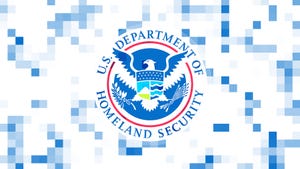Cisco Told to Pay $1.9 Billion in Security-Patent Trial Loss
Centripetal claimed the networking giant copied patented cybersecurity features and shut it out of government contracts.
October 6, 2020

Susan Decker (Bloomberg) -- Cisco Systems Inc. was told to pay $1.9 billion after losing a trial brought by a Virginia company that claimed the networking giant copied patented cybersecurity features and shut the smaller company out of government contracts.
Cisco infringed four patents owned by Centripetal Networks Inc., District Judge Henry Morgan in Norfolk ruled. The judge heard the month-long trial over video conference in June after canceling the use of a jury because of the coronavirus pandemic. Cisco said it would appeal the decision.
Centripetal Networks, based in Herndon, Virginia, said it developed a network protection system, funded in part by a grant from the Department of Homeland Security, only to see Cisco integrate the inventions into its own networks after meetings and presentations by Centripetal officials.
“The fact that Cisco released products with Centripetal’s functionality within a year of these meetings goes beyond mere coincidence,” Morgan said.
The judge said Centripetal was owed $755.8 million for past use of the inventions, which he increased by two-and-a-half times after finding that Cisco’s infringement was “willful and egregious.” He also ordered that Cisco pay a 10% royalty on sales of some of its products for the next three years, and then 5% in royalties for three years after that.
Jonathan Rogers, Centripetal’s chief operating officer, said the company was “thrilled” with the ruling.
“It’s been a long time coming and was very hard fought,” he said in an interview.
The total damage award accounts for less than three months of profit for Cisco. The company reported net income of more than $11.04 billion for calendar year 2019. It’s also one of the most cash-rich companies in technology. In August it reported cash, cash equivalents and investments of $29.4 billion.
Cisco said its cybersecurity features were developed long before Centripetal was founded a decade ago. San Jose, California-based Cisco said Centripetal hasn’t been successful in getting government and university contracts because its ideas were too complicated.
Cisco said it will appeal to the U.S. Court of Appeals for the Federal Circuit, which specializes in patent law.
“We are disappointed with the trial court’s decision given the substantial evidence of non-infringement, invalidity and that Cisco’s innovations predate the patents by many years,” Cisco said in a statement.
Centripetal said sales had been doubling each year from 2015 until it met with Cisco for a partnership and “got close to getting married but got left at the altar,” as Centripetal lawyer Paul Andre of the firm Kramer Levin put it in opening arguments. He said Centripetal told Cisco about its inventions in 2016 and “Cisco kept coming back and asking for more.”
After the judge’s decision was released, Andre called it a “significant win for all small, innovative companies” and said Morgan “rejected the primitive doctrine that might makes right.”
In June 2017, Cisco announced its Encrypted Traffic Analytics, which David Goeckeler, then head of Cisco’s network and security, said “solves a network security challenge previously thought to be unsolvable.”
Cisco lawyer Dabney Carr of Troutman Sanders said Cisco, founded in 1999, has a long history of developing network security products and even has written books on the topic.
“Cisco is proud of the network security it provides; it just doesn’t infringe these patents,” Carr said in closing arguments. He said there is a “cavernous gap” between what the patents cover and Centripetal’s infringement allegations.
The judge found that the introduction of the cybersecurity features resulted in “a dramatic increase in sales which Cisco touted in both technical and marketing documents.”
The trial was originally supposed to be held before a jury but the courthouse is closed to the public because of the coronavirus pandemic. Instead, Morgan, who became a federal judge in 1991 and took senior status in 2004, conducted the trial over the Zoom teleconferencing app.
The opinion was released after Morgan issued an order denying Cisco’s request that he recuse himself from the case. The judge’s wife owns shares of Cisco, bought at the recommendation of a broker. Morgan said he had already reached his conclusion on the case, though not finished writing the opinion, when he learned of the ownership.
The case is Centripetal Networks Inc. v. Cisco Systems Inc., 18-94, U.S. District Court for the Eastern District of Virginia (Norfolk).
(Updates with comments beginning in sixth paragraphs. An earlier version of this story corrected an error in Cisco’s profit.)
--With assistance from Ian King and Matthew Bultman.
About the Author
You May Also Like









